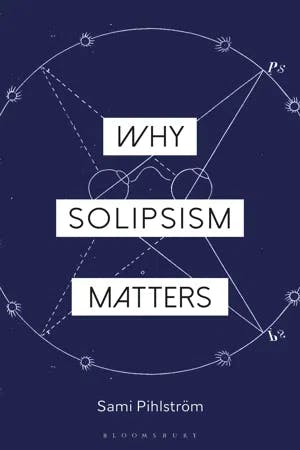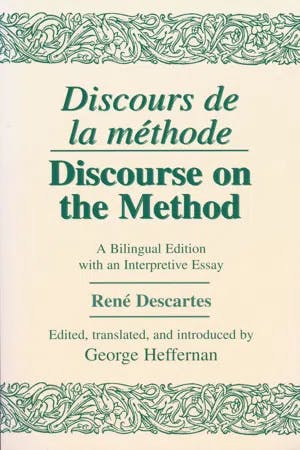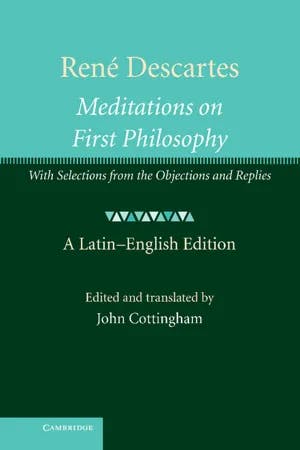What is Solipsism?
PhD, Media Arts (Royal Holloway, University of London)
Date Published: 21.09.2023,
Last Updated: 21.12.2023
Share this article
Defining solipsism & the simulation hypothesis
If you’ve ever seen The Matrix (Wachowski, 1999) and witnessed Neo (Keanu Reeves) choose the red pill, which reveals everything he thought to be real to be a simulation, it may have got you thinking: How do I know my life isn’t a simulation? How can I be sure I'm not in the Matrix?
The doubt that Morpheus provokes here is part of the larger question posed by solipsism – which is related to the “simulation hypothesis” – a familiar philosophical problem across all epistemological schools of thought.
The word solipsism comes from the Latin “sol”, meaning “alone”, and “ipse”, meaning “self”. It refers to the philosophical idea that the only thing we can be sure to exist is our own mind. Solipsism proposes that everything outside our individual capacity to think – the material world, our bodies, the consciousness of others – are vulnerable to doubt and, therefore, cannot be said to exist with any certainty. Illustrated by Neo’s epiphany, it describes the skepticism whereby everything we think we experience and know could be a mere mental construct. In the contemporary context of advanced technology and artificial intelligence, this problem is better known as simulation theory or the simulation hypothesis, but it raises the same, age-old problem of how we can prove that our individual minds are not the only things that exist. There have been partially successful efforts to undermine the inevitability of solipsism. The following study guide will outline some of the ways in which different philosophical schools of thought have been subject to the pitfall of solipsism and the attempts to repudiate it.
Many philosophers would agree that solipsism is symptomatic of a fallible epistemological system. Hence, there are very few philosophers who would claim to be solipsists; it is not particularly useful or productive to imagine our mind to be the only thing that has a proven existence. Philosophy is, in part, supposed to lead us to substantive claims about the world and solipsism is a roadblock in that endeavor. If there is no one to receive our ideas and our ideas don’t correspond to or organize any outside world, why even do philosophy? Sami Pihlström answers this question, proposing:
A careful consideration of solipsism might teach us something about other philosophical positions that we are more likely to adopt and defend, and about the ways in which we may be justified in defending them. The legitimation of an examination of solipsism need not, then, lie solely in the intrinsic importance—if there is any—of solipsism itself. Rather, solipsism may be relevant also, or even primarily, due to its metaphilosophical significance. (2020).
Sami Pihlström
A careful consideration of solipsism might teach us something about other philosophical positions that we are more likely to adopt and defend, and about the ways in which we may be justified in defending them. The legitimation of an examination of solipsism need not, then, lie solely in the intrinsic importance—if there is any—of solipsism itself. Rather, solipsism may be relevant also, or even primarily, due to its metaphilosophical significance. (2020).
The threat of solipsism provides philosophers with the motivation to disprove it, to rethink the relationship between consciousness and other philosophical enquiries. Pihlström notes that solipsism is not only contended with by philosophers, noting,
literary theorists may regard solipsism as an expression of extreme human loneliness, the inevitable isolation of an individual consciousness… Biologists, psychologists, cognitive scientists, or philosophers of biology and psychology may, in turn, address the empirical question of why living organisms usually are not solipsistically “programmed.” (2020).
Sami Pihlström
literary theorists may regard solipsism as an expression of extreme human loneliness, the inevitable isolation of an individual consciousness… Biologists, psychologists, cognitive scientists, or philosophers of biology and psychology may, in turn, address the empirical question of why living organisms usually are not solipsistically “programmed.” (2020).
We see here how solipsism is a common threat to philosophers, writers, artists and scientists alike, suggesting it to be a unique feature of the human condition.
Historical origins of solipsism
In his book Zhuangzi (476–221 c. BC [2003]), the ancient Taoist philosopher by the same name wrote,
Once Zhuang Zhou dreamt he was a butterfly, a butterfly flitting and fluttering around, happy with himself and doing as he pleased. He didn’t know he was Zhuang Zhou. Suddenly he woke up and there he was, solid and unmistakable Zhuang Zhou. But he didn’t know if he was Zhuang Zhou who had dreamt he was a butterfly, or a butterfly dreaming he was Zhuang Zhou. (476–221 c. BC [2003])
Zhuangzi
Once Zhuang Zhou dreamt he was a butterfly, a butterfly flitting and fluttering around, happy with himself and doing as he pleased. He didn’t know he was Zhuang Zhou. Suddenly he woke up and there he was, solid and unmistakable Zhuang Zhou. But he didn’t know if he was Zhuang Zhou who had dreamt he was a butterfly, or a butterfly dreaming he was Zhuang Zhou. (476–221 c. BC [2003])
This allegory serves as an early illustration of the uncertainty associated with solipsism. How can we trust our experience and make meaningful claims about our existence? How can we be sure that everything we think we know is not merely an illusion?
In Western philosophy, this same uncertainty was the outcome of the extreme doubt practiced by René Descartes (1596-1650). Descartes was a rationalist, meaning he held that the mind has the ability to generate knowledge independent of experience, using the faculties of logic and reason. Troubled by the potential to believe something that was not true, Descartes arrived at a rationalist school of thought through the hard examination of all his beliefs. This systematic skepticism would leave him with only the beliefs he could be absolutely certain of. He found, firstly, that his senses could be deceived. Like Zhuangzi (late 4th c. BC), Descartes wondered how we know we are not dreaming. We may think we can see, feel, smell the world around us, but it could be a mere mental construct or delusion. As a result, Descartes was forced to conclude that we cannot trust our senses, nor can we trust the existence of an external world where these experiences might originate.
Descartes also considered the proof of a corporeal existence and came to the same conclusion. The famous illustration of this Cartesian doubt is the “brain in a vat” thought experiment. It asks how we can be certain that we are not a brain floating in a vat, hooked up to an elaborate technological system that can fully simulate experiences of the world? If this were the case, we would think we were a body, moving through the world without the outside world or our body existing.
This doubt about the body led Descartes to question existence more broadly. If I cannot be certain of the world around me, nor can I be certain of my own body and its experiences, then how can I know I exist? Descartes famously concluded that, to have the ability to doubt – to question what knowledge is – necessitates a thinking entity. This idea – this crucial piece of evidence – spawned the famous declaration “Cogito, ergo sum,” published in Discourse on the Method (1637) and commonly translated to,
I think, therefore I am. (1637)
This position is inherently solipsistic; it presents an individual consciousness that does not extend to the certainty of an outside world, the existence of others, or belong in any larger physical entity. The way that Descartes avoided the misery of solipsism all together was through the rationalist justification of God. God is good and benevolent, and he has gifted humankind with the ability to comprehend an external world; God would not deceive us, therefore the objects of our consciousness must exist.
In order to follow this verification of the outside world and the minds of others, we would have to buy into Descartes' justification of God. This is not something that post-enlightenment philosophers could easily do, particularly in the wake of modern empiricism. Descartes outlines the difficulty of justifying the belief in God, writing,
For us who are believers, it is enough to accept on faith that the human soul does not die with the body, and that God exists; but in the case of unbelievers, it seems that there is no religion, and practically no moral virtue, that they can be persuaded to adopt until these two truths are proved to them by natural reason. (1641 [2013])
René Descartes
For us who are believers, it is enough to accept on faith that the human soul does not die with the body, and that God exists; but in the case of unbelievers, it seems that there is no religion, and practically no moral virtue, that they can be persuaded to adopt until these two truths are proved to them by natural reason. (1641 [2013])
Descartes admits that it seems you must believe in God in order to find justification for that belief. While Descartes hopes his philosophy can provide such proof, it is not a sure-fire means of refuting solipsism.
The problem of other minds
Descartes established the irrefutable existence of his own mind, but provokes extreme skepticism about the existence of anything outside of it. This is a particular challenge for empiricist philosophers who hold that the only knowledge we can claim to have is that which is garnered through sensory experience. Many empiricists espoused “sense data” as the primary means to knowledge acquisition, a term used to describe the raw substance of experience. Sense data dictates that every experience has a certain recognizable characteristic. If I see something that is red, I experience the sensation of red, and this is how I can make a knowledge claim as to what “red” is. But, under Cartesian doubt, we cannot claim to know that the red object is indeed red, or that it exists at all. Even assuming that the outside world and other minds do exist, how would we know that my sensation of ‘red’ is the same as yours? The idea of sense data, thus, is entirely private, making it a particular victim of solipsistic doubt.
Ludwig Wittgenstein (1889-1951) addressed the uncertainty of sense data, claiming that we do not have to be sure that we refer to the same things in reality – or even that those things exist – to have meaningful discourse. Wittgenstein develops the “private language argument” in Philosophical Investigations (1953 [2010]). He provokes the reader to imagine there is a language only understood by the person who speaks it. What use would it be to assign words to things, if it was meaningless to everyone but themselves? If I was the only mind in existence, I would speak a language that only I could understand, which would defeat the whole purpose of language. Language is public, communal, not just referring to logically private experiences. Wittgenstein writes,
If I say of myself that it is only from my own case that I know what the word “pain” means — must I not say that of other people too? And how can I generalize the one case so irresponsibly? (1953 [2010])
Ludwig Wittgenstein
If I say of myself that it is only from my own case that I know what the word “pain” means — must I not say that of other people too? And how can I generalize the one case so irresponsibly? (1953 [2010])
Wittgenstein suggests here that this is a case of inductive reasoning, whereby we take one single instance of experience – our own – and make grossly generalized statements about the experience of others.
To outline that the very idea of private meaning is entirely ineffectual, Wittgenstein comes up with the “beetle-in-a-box” thought experiment. Wittgenstein supposes that every person has a black box. They can only look in their own box and not in anyone else’s. He imagines that each person calls what is in their box, a “beetle.” For Wittgenstein, the “box” is the analog of the privacy of the mind, and “the beetle” inside stands for sense data that fills it. According to many empiricists, a person could only claim to know what a beetle is by looking at their own “beetle.” Wittgenstein points out that “it would be quite possible for everyone to have something different in [their] box” or indeed nothing at all (1953 [2010]). Despite it being more than likely that no two boxes would hold the same contents and, therefore, no two people would be describing the same thing, by using the word “beetle” to describe whatever the content of the box is, meaningful discourse can be had because the word “beetle” is irrelevant to the object itself. It has meaning because of the communal decision as to what it represents: in its public use its meaning can be known. In other words, whatever may be in each box does not have any bearing on the shared public use of the word “beetle.” Each person could be justified in knowing the meaning of the word “beetle.”
Wittgenstein suggests that by only examining your private experience of the world no knowledge can be claimed. For Wittgenstein, it is of no matter that we cannot experience the sensations of others because we can make connections between our separate experiences through the practice of language. All that can be meaningfully discussed is what we have practical and public experience of. Wittgenstein writes,
If we construe the grammar of the expression of sensation on the model of “object and name,” the object drops out of consideration and is irrelevant. (1953 [2010])
For Wittgenstein, language refers to the “logical form” of reality, rather than reality itself (Toward Logical Form, 2014). This is, overall, a pragmatist approach to solipsism that claims that knowledge and meaning derive from the standards of public practice. While this may partly tackle the problem of the privacy of experience, it still presumes the existence of other minds. Descartes establishes that there is no necessary, logical connection between the mind and the body, or the mind and the physical world, but Wittgenstein proves that this is not crucial in our ability to communicate. We do not need to have proof of a coherent outside world in order to have meaningful discourse about the world. We do, however, need to know that the minds of others exist for the private language argument or beetle-in-a-box thought experiment to hold. It assumes that other minds exist and that they operate in the same way ours do. This is what’s known as “the problem of other minds.” While it is sometimes speculated that Wittgenstein’s private language argument has refuted the problem of other minds – why would a language exist that only referred to my own private sensations? – it still seems plausible that communication could be an elaborate illusion, only existing in our own minds.
Solipsism’s enduring presence
It is decidedly true that we are unable to extend our perception beyond the confines of our own consciousness; our perceptions limit us. As Immanuel Kant asserts in The Critique of Pure Reason,
What may be the nature of objects considered as things in themselves and without reference to the receptivity of our sensibility is quite unknown to us. We know nothing more than our mode of perceiving them… (1781 [2022])
Immanuel Kant
What may be the nature of objects considered as things in themselves and without reference to the receptivity of our sensibility is quite unknown to us. We know nothing more than our mode of perceiving them… (1781 [2022])
Pihlström echoes Kant, asserting,
Solipsism then arises as a philosophical problem from the uniqueness of the first-person perspective, that is, my perspective on the world as an individual. (Why Solipsism Matters, 2020)
This serves to illustrate how solipsistic uncertainty permeates many diverse fields of philosophy and reflections about the self and the world more generally. Without access to the noumenal world – that is, the world as it is in itself – how can we claim to know anything about the existence of the outside world? And without access to other minds, how can we corroborate our experience, or more troubling still, verify their existence? Newer philosophies, such as posthumanism and new materialism, open themselves up to dethroning the human experience - interested instead in exploring what lies beyond the human, arguing that all matter matters. Still, no one philosopher or school of thought has been able to thoroughly subvert solipsism. In all cases, it remains a threat to philosophical certainty.
Curiously, solipsism seems at once to be philosophically unavoidable, and an idea that no one can accept to be true. Of this, Pihlström writes,
Any philosophizing we engage in is inseparable from our task of knowing ourselves. We do not want to be solipsists—we need to reject solipsism—and there must be means of saying, beyond argument, why. (Why Solipsism Matters, 2020)
Philosophical discussion does not have an end; there is no final point to it all. So, solipsism becomes an ever-present threat in this ongoing discourse, despite our ambitions to override it.
Further solipsism reading on Perlego
The Threat of Solipsism: Wittgenstein and Cavell on Meaning, Skepticism, and Finitude by Jônadas Techio.
Descartes's Concept of Mind by Lilli Alanen
Wittgenstein by William Child
Wittgenstein and the Limits of Language by Hanne Appelqvist
Kant's Radical Subjectivism: Perspectives on the Transcendental Deduction by Dennis Schulting
The Solipsism of Modern Fiction: Comedy, Tragedy, and Heroism by Harold Kaplan
Solipsism FAQs
What is solipsism in simple terms?
What is solipsism in simple terms?
What are the historical origins of solipsism?
What are the historical origins of solipsism?
What is the problem of other minds?
What is the problem of other minds?
What is Wittgenstein’s private language argument?
What is Wittgenstein’s private language argument?
What is Wittgenstein’s “beetle-in-a-box” experiment?
What is Wittgenstein’s “beetle-in-a-box” experiment?
Bibliography
Cottingham, J. (2013) René Descartes: Meditations on First Philosophy. Cambridge University Press. Available at: https://www.perlego.com/book/3548701/ren-descartes-meditations-on-first-philosophy-with-selections-from-the-objections-and-replies-pdf
Kant, I. (2022) The Critique of Pure Reason. Otbe book publishing. Available at: https://www.perlego.com/book/3556929/the-critique-of-pure-reason-pdf
Pihlström, S. (2020) Why Solipsism Matters. Bloomsbury Publishing. Available at: https://www.perlego.com/book/1387469/why-solipsism-matters-pdf
Reed, L. (2014) Toward Logical Form. Taylor and Francis. Available at: https://www.perlego.com/book/1663884/toward-logical-form-an-exploration-of-the-role-of-syntax-in-semantics-pdf
Wittgenstein, L. (2010) Philosophical Investigations. 4th edn. Wiley. Available at: https://www.perlego.com/book/2765823/philosophical-investigations-pdf
Zhuangzi (2003) Zhuangzi: Basic Writings. Columbia University Press. Available at:https://www.perlego.com/book/775745/zhuangzi-basic-writings-pdf
PhD, Media Arts (Royal Holloway, University of London)
Aoiffe Walsh has a PhD in Media Arts from Royal Holloway, University of London. With a background in film studies and philosophy, her current research explores British literary modernism, with a particular focus on surrealism between the wars. She has lectured and published pieces on documentary and film theory, film history, genre studies and the avant-garde.






